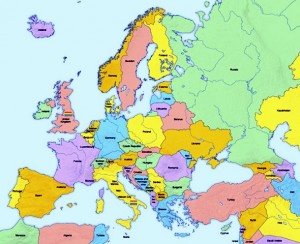Terminology matters. As the 2020 presidential election cycle heats up, there is a great deal of banter in the air, among politicians, pundits, journalists, citizens, etc., about terms such as “socialism,” “Democratic Socialism,” “the radical left,” “welfare state,” capitalism and others. I am not an expert in economics or political science, but I offer the following thoughts as a concerned and active citizen as we make vital decisions about our future as a nation.
Socialism. A sampling of definitions includes the following:
- “A theory or system of social organization that advocates the ownership and control of industry, capital, and land by the community as a whole.” The Random House Dictionary, 1983

- “A political and economic theory of social organization which advocates that the means of production, distribution, and exchange should be owned or regulated by the community as a whole.” Google
- “Any of various economic and political theories advocating collective or governmental ownership and administration of the means of production and distribution of goods. 2a: a system of society or group living in which there is no private property. b: a system or condition of society in which the means of production are owned and controlled by the state.” Merriam-Webster online
- “Social and economic doctrine that calls for public rather than private ownership or control of property and natural resources.” Encyclopaedia Britannica online. This article goes on to explain how some forms of socialism are in direct contrast with capitalism.
To my knowledge, none of the Democratic candidates are advocating socialism under these definitions. However, conservatives would like us to think that most or all of them do. Relatedly, none of the nations of Europe to which conservatives appeal are strictly socialist; we will examine some of the nuances below.
Democratic Socialism. As we noted earlier, Democratic Socialism in the US is not a political party; rather, there is an organization called Democratic Socialists of America, a political and activist organization to which members pay dues. According to a 2015 CNN article, “democratic socialists opposed the totalitarian governments of the Soviet Union, China and their satellites. That’s because democratic socialism is about democracy – giving ordinary people a greater voice in both politics and the workplace.” This is the philosophy to which Vermont Senator Bernie Sanders has long held. (And there is an interesting argument that Sanders is closer to being a “social Democrat” than a democratic socialist.) Currently DSA has campaigns in the areas of Medicare for All, unions, and electoral power.
 Capitalism. Here is a sampling of definitions:
Capitalism. Here is a sampling of definitions:
- “An economic system in which investment in and ownership of production and distribution is made and maintained chiefly by private individuals or corporations.” The Random House Dictionary, 1983
- “An economic and political system in which a country’s trade and industry are controlled by private owners for profit, rather than by the state.” Google
- “An economic system based on private ownership of property and business, with the goal of making the greatest possible profits for the owners.” Cambridge Dictionary online
- “An economic and political system in which property, business, and industry are owned by private individuals and not by the state.” Collins Dictionary online
As we have mentioned time and again, our sister nations throughout the world – in Europe, as well as Canada, Australia, New Zealand, South Korea, Japan and others – are all capitalist countries. They have market economies and “free enterprise.” It is also important to note that Massachusetts Senator and 2020 Presidential candidate Elizabeth Warren, for instance, supports capitalism.
Hypercapitalism.  I discussed hypercapitalism earlier, defining it as “the market on steroids, with few constraints.” I can find very few other definitions, although there is now a 2018 book by Larry Gonick and Tim Kasser with the title, Hypercapitalism: The Modern Economy, Its Values, and How to Change Them. It is this extreme form of capitalism – when the largest advantages of the market economy go to a very small proportion of the citizenship and the rest of the population suffers or stagnates for decades – that most progressives oppose.
I discussed hypercapitalism earlier, defining it as “the market on steroids, with few constraints.” I can find very few other definitions, although there is now a 2018 book by Larry Gonick and Tim Kasser with the title, Hypercapitalism: The Modern Economy, Its Values, and How to Change Them. It is this extreme form of capitalism – when the largest advantages of the market economy go to a very small proportion of the citizenship and the rest of the population suffers or stagnates for decades – that most progressives oppose.
Social safety net. The Business Dictionary online defines the social safety net in this way: “Social welfare services provided by a community of individuals at the state and local levels. These services are geared toward eliminating poverty in a specific area. These services may include housing re-assignment, job placement, subsidies for household bills, and other cash equivalents for food. Social safety net works in conjunction with a number of other poverty reduction programs with the primary goal of reducing/preventing poverty.” While this is basically a definition that pertains to the US, the World Bank goes on to extend the definition to developing countries: “Safety net programs include cash and in-kind transfers targeted to poor and vulnerable households, with the goal of protecting families from the impact of economic shocks, natural disasters, and other crises. . . . Evidence now shows how safety nets cash transfers not only help nations invest in human capital, but also serve as a source of income for the poor, improving their standard of living. Today, some 2.5 billion people are covered by safety net programs and some 650 million people or 56 percent of the poorest quintile.”
 On the European front, according to Linda Carr in Social Europe, the social safety net – or social protection – is “the principle of assisting the most vulnerable in society and guaranteeing a minimum standard of wellbeing.” This, however, not only helps prevent poverty; social protection “drives not only universal social rights but also economic development and quality job creation.” That is, the social safety net serves not only the vulnerable and potentially poor but the entire society.
On the European front, according to Linda Carr in Social Europe, the social safety net – or social protection – is “the principle of assisting the most vulnerable in society and guaranteeing a minimum standard of wellbeing.” This, however, not only helps prevent poverty; social protection “drives not only universal social rights but also economic development and quality job creation.” That is, the social safety net serves not only the vulnerable and potentially poor but the entire society.
Welfare state. Here are a few definitions:
- “A system whereby the government undertakes to protect the health and well-being of its citizens, especially those in financial or social need, by means of grants, pensions, and other benefits. The foundations for the modern welfare state in the US were laid by the New Deal programs of President Franklin D. Roosevelt.” Google
- “A social system based on the assumption by a political state of primary responsibility for the individual and social welfare of its citizens.” Merriam-Webster online
- A 2009 article by Russell Shorto in the New York Times may be a little outdated, but one quote is worth considering: “Maybe we Americans have set up a false dichotomy. Over the course of the 20th century, American politics became entrenched in two positions, which remain fixed in many minds: the old left-wing idea of vast and direct government control of social welfare, and the right-wing determination to dismantle any advances toward it, privatize the system and leave people to their own devices. In Europe, meanwhile, the postwar cradle-to-grave idea of a welfare state gave way in the past few decades to some quite sophisticated mixing of public and private. And whether in health care, housing or the pension system (there actually is still a thriving pension system in the Netherlands, which covers about 80 percent of workers), the Dutch have proved to be particularly skilled at finding mixes that work.”
Workfare state. I first came upon this term reading Steven Hill’s 2010 book, Europe’s Promise. In a 2010 review in Free Press, author John Lawrence explains, “Rather [than] being a welfare state, Hill describes European society as a workfare state. Seen in this light everything that is done that benefits the average citizen does so in order to enable him or her to be a better and more productive worker.  Universal health care enables small business to concentrate on business without having to be responsible for health care in exchange for a tax that is far lower than what the average American small business spends on their employees’ private health care plans. . . Government is an enabler rather than a disabler of business, and as such, Europe has become an economic powerhouse far outstripping the US in many indices.”
Universal health care enables small business to concentrate on business without having to be responsible for health care in exchange for a tax that is far lower than what the average American small business spends on their employees’ private health care plans. . . Government is an enabler rather than a disabler of business, and as such, Europe has become an economic powerhouse far outstripping the US in many indices.”
There is more recently an opposite definition of workfare state. According to Wikipedia, there are “workfare” systems “that encourage direct employment to get individuals off the welfare roll and directly into the workforce, and those that are intended to increase human capital by providing training and education to those currently in the welfare system.” These workfare plans, now in effect in the US and other countries, are controversial for any number of reasons.
Toward Nuance and Clarity
I would urge us all – citizens, journalists, politicians, elected officials – to be very careful about the terms we use to discuss what we want in the US vis-à-vis economic and social systems. I would argue that we do not want the following:
- Socialism in the form of industry and the means of production being owned and operated by the government;
- Hypercapitalism, an extreme version of capitalism (which we have now) that enriches only 1-10 percent of the population and harms the vast majority of citizens;
- A welfare state that perpetuates generational poverty;
- Confusion around terminology that strangles progress and programs that promote the common good.
Instead, what most Americans want – based on polls, election results, anecdotes, and interviews – might be covered under one or more of these terms:
- Social capitalism
- Compassionate capitalism. This term is used in a July 2018 article from Forbes to describe Nordic countries. As author Jeffrey Dorfman notes, “Regardless of the perception, in reality the Nordic countries practice mostly free market economics paired with high taxes exchanged for generous government entitlement programs.”
- Capitalism (or a market economy) with a robust social safety net.
- A workfare state along the lines of the most successful European countries.
If we automatically assume that these desires are “too expensive” and stop the discussion before it’s even begun, we will never arrive at those systems and will continue along the same sorry paths. We Americans pride ourselves on our creativity, our innovative and entrepreneurial natures, and our success in many initiatives that we undertake. If we really want what we have laid out here, and if there is the political will to attain those goals, we can do it. If our sister nations can forge successful societies – as they have for the past 70 plus years – we can as well. We need to see logical, well-conceived plans with good dollar figures attached – here is the challenge for our politicians, leaders, economists, financial experts, sociologists and others. Let’s do this!
Suggested Reading
Hill, Steven. Europe’s Promise: Why the European Way is the Best Hope in an Insecure Age. Berkeley and Los Angeles, CA: University of California Press, 2010.
